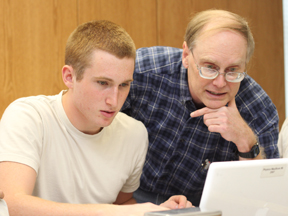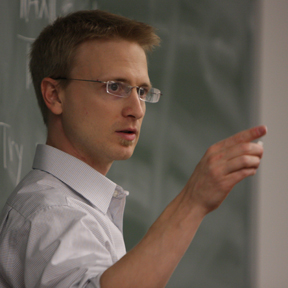Thanks to an innovative new program, Wabash College students interested in engineering will be able to pursue a combined, dual degree program in partnership with the Purdue University College of Engineering.
Students who participate in the program will earn a bachelor of arts degree from Wabash and a bachelor of science in engineering from Purdue. In announcing the new dual degree program, Wabash President Pat White said the benefit for students is a firm grounding in the liberal arts accompanied by a world-class engineering degree.

“It is significant that this innovative work was driven by faculty in mathematics, physics, and chemistry at Wabash,” said President White. “The interconnections among the sciences will be at the heart of this program as students learn to think across disciplinary boundaries to perfect preparation for the creative and practical action that goes into engineering. This collaboration will enable Wabash men to build on their grounding in the liberal arts, achieve success in one of the best engineering programs in the world, and graduate to make a great difference in addressing some of the thorniest questions of our times.”
Leah Jamieson, the John A. Edwardson Dean of Engineering at Purdue, said: "The partnership is important to the College of Engineering's mission of working with other higher education institutions in Indiana to grow the number of students with a broad and integrated education in the science, technology, engineering and mathematics (STEM) fields."

The dual degree engineering program with Purdue mirrors Wabash’s long-standing and similar programs at Columbia University and Washington University in St. Louis. Students begin their education at Wabash, where they will complete much of their degree in three years. Once the student has completed the recommended set of courses with a minimum grade point average of 3.0, he will be granted admission to Purdue. Students will enroll in engineering programs of their choice, including mechanical, electrical, computer, chemical, or multidisciplinary engineering.

“Dual degree engineering students get the best of both worlds,” said Chad Westphal, assistant professor of mathematics at Wabash and one of the program’s designers. “He becomes grounded in a quality liberal arts education where student faculty interaction is highly valued, where class sizes are small, and where speaking well, writing well and living well are highly valued. He completes both a major and a minor at Wabash, so his core knowledge of science is typically stronger than in a traditional engineering program. He also studies engineering at a top institution, where his disciplinary skills are rigorously honed for a career in engineering.”
Michael Harris, Purdue associate dean of engineering for undergraduate education, said: "The partnership with Wabash College provides us with the opportunity to bring exceptional undergraduates into engineering from an institution with strong science programs. Students with dual degrees in science and engineering are well suited for graduate studies in areas such as biotechnology, medicine, nanotechnology, nanoelectronics, catalysis, energy, and engineering and science education.”
Westphal also noted the fact that Wabash and Purdue are geographically close to one another. “This represents a local connection between a major university and a top-notch liberal arts college.”
Dean of Admissions and Financial Aid Steve Klein believes the relationship with Purdue will give Wabash a boost in recruiting students who want to study both engineering and the liberal arts. He also said many Indiana students would qualify for state higher education grants, which can’t be applied to Wabash’s 3-2 programs with Columbia and Washington.
“As many as 10% of the students considering Wabash indicate an interest in engineering,” Klein said. “Adding a state university to the mix of available options should be a plus to the many Hoosier families looking at Wabash. Beyond the financial benefit, Purdue's proximity will allow participating students to stay connected to their Wabash friends and organizations.”
Dean of the College Gary Phillips credited Wabash’s faculty for driving the program through to completion.
“This articulation agreement would not have happened absent the determined efforts of Chad Westphal and Dennis Krause,” Dean Phillips said. “Over the past two years Chad has taken the lead in hammering out the curricular details for the engineering and in crafting the document that we now have in place. This is but one more example of the way Wabash faculty take leadership and responsibility in securing opportunities for our students. I am grateful to Chad and Dennis for all that they have accomplished on behalf of Wabash.”
Westphal says Wabash students will have to be driven to succeed since they must complete their Wabash requirements in just three years. “It won't be easy, but it will be worth it” is a pretty good way of describing the Wabash/Purdue dual degree program,” Westphal said.
 “It is significant that this innovative work was driven by faculty in mathematics, physics, and chemistry at Wabash,” said President White. “The interconnections among the sciences will be at the heart of this program as students learn to think across disciplinary boundaries to perfect preparation for the creative and practical action that goes into engineering. This collaboration will enable Wabash men to build on their grounding in the liberal arts, achieve success in one of the best engineering programs in the world, and graduate to make a great difference in addressing some of the thorniest questions of our times.”
“It is significant that this innovative work was driven by faculty in mathematics, physics, and chemistry at Wabash,” said President White. “The interconnections among the sciences will be at the heart of this program as students learn to think across disciplinary boundaries to perfect preparation for the creative and practical action that goes into engineering. This collaboration will enable Wabash men to build on their grounding in the liberal arts, achieve success in one of the best engineering programs in the world, and graduate to make a great difference in addressing some of the thorniest questions of our times.” The dual degree engineering program with Purdue mirrors Wabash’s long-standing and similar programs at Columbia University and Washington University in St. Louis. Students begin their education at Wabash, where they will complete much of their degree in three years. Once the student has completed the recommended set of courses with a minimum grade point average of 3.0, he will be granted admission to Purdue. Students will enroll in engineering programs of their choice, including mechanical, electrical, computer, chemical, or multidisciplinary engineering.
The dual degree engineering program with Purdue mirrors Wabash’s long-standing and similar programs at Columbia University and Washington University in St. Louis. Students begin their education at Wabash, where they will complete much of their degree in three years. Once the student has completed the recommended set of courses with a minimum grade point average of 3.0, he will be granted admission to Purdue. Students will enroll in engineering programs of their choice, including mechanical, electrical, computer, chemical, or multidisciplinary engineering. “Dual degree engineering students get the best of both worlds,” said Chad Westphal, assistant professor of mathematics at Wabash and one of the program’s designers. “He becomes grounded in a quality liberal arts education where student faculty interaction is highly valued, where class sizes are small, and where speaking well, writing well and living well are highly valued. He completes both a major and a minor at Wabash, so his core knowledge of science is typically stronger than in a traditional engineering program. He also studies engineering at a top institution, where his disciplinary skills are rigorously honed for a career in engineering.”
“Dual degree engineering students get the best of both worlds,” said Chad Westphal, assistant professor of mathematics at Wabash and one of the program’s designers. “He becomes grounded in a quality liberal arts education where student faculty interaction is highly valued, where class sizes are small, and where speaking well, writing well and living well are highly valued. He completes both a major and a minor at Wabash, so his core knowledge of science is typically stronger than in a traditional engineering program. He also studies engineering at a top institution, where his disciplinary skills are rigorously honed for a career in engineering.”